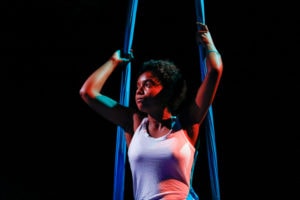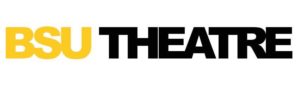In response to the growing momentum behind the #MeToo Movement, Bowie State University Theatre has dedicated their season to the creation of a new, devised performance entitled #MeToo. Through interviews, research and personal narrative, Bowie State University student artists have generated a multidisciplinary performance that shares the intimate challenges and powerful survival of those who have experienced sexual harassment and abuse.

Student artists and faculty recognized that presenting a narrative through the mode of realism could potentially cause greater harm to those who have experienced abuse and would not express many thoughts for which there are no words. In light of this, they have explored various modes of “language” —verbal and non-verbal, physical and aural, light and projected image. Moving out of traditional theatre performance, they have also incorporated silk choreography in a “liminal space” where characters ascend and fall, mirroring the extreme range of emotions experienced in trauma without exposing the audience to graphic depiction of such activities.
This immersive, intimate production will be experienced by small audiences of 15 that will move with the action through various spaces, engaging all the senses. The students’ hope is that they are able to become a community that gives voice to those who have remained silent.
DCMTA was able to chat with some of the student artists about their experiences creating and producing this show.

RYAN ANTHONY (Robert/Actor/Playwright)
What was it like to devise a show around the #MeToo movement?
Devising this piece was a very rewarding process. To be able to help in the playwriting process and to be an actor in it gave me an opportunity to see the “ins and outs” of a production from both sides of the spectrum and I thank God for the opportunity.
How do you think the immersive aspect of the show impacts audience experience?
The immersive aspect of the show gives the audience no choice but to not only pay attention to the action, but have a level of intimacy that is unlike a traditional theatre experience.
What impact do you feel the #MeToo movement has had on society?
The #MeToo movement has allowed light to shed on a subject that had been very dormant for a very long time.
As an artist, how do you think theatre impacts social justice movements on a larger scale?
As an artist, every little bit helps. Theatre for social justice is a concept that can be unorthodox, but if it get the results it needs to, then as an artist, I totally agree with it.

KAYLIN LUCES (Lena/Actor)
What was it like to devise a show around the #MeToo movement?
Creating a devised piece around the #MeToo movement was a very taxing goal. It took a considerable amount of strength to accurately come up with scenes and concepts that are other people’s experiences on a daily basis, based on research conducted by many students. Because it is such hard topics to deal with, and frankly, a very uncomfortable one to portray, it became very important to separate ourselves from the characters and allow them to go through very painful events to hopefully inspire those who witness.
How do you think the immersive aspect of the show impacts audience experience?
The staging is incredibly intimate and there is no way to look away because you feel uncomfortable. It forces you to watch and it forces you to actually listen. It is undeniably in your face happening. This may be a lot for some people, but the discomfort is what is so impactful and a strong impact encourages actual change.
What impact do you feel the #MeToo movement has had on society?
The #MeToo movement has done an amazing job of holding others accountable for their actions. The best part is that they are actually suffering consequences for it as well. Movements like #MeToo give the previously voiceless a platform to freely take a stand against sexual violence. That is how reform is made.
As an artist, how do you think theatre impacts social justice movements on a larger scale?
Theater can be a very digestible explanation of social justice movements when done correctly. Theater is treated not as a right, it is a luxury, and certain groups of marginalized people do not have the luxury to take the time or pay the money to go see a show, making theater a somewhat classist art form that ignores the people that the message should really go to. If the performance is well publicized in areas that don’t typically consider going to shows and they were free/extremely affordable, I think it could really give movements some leverage.

MECCA BRYANT (Dana/Actor)
What was it like to devise a show around the #MeToo movement?
Although this was not the first production we’ve done this year based off of the #MeToo movement this one definitely close to home. I didn’t think having secondhand experience with this topic would bring so much emotion out of me, so at times it was challenging. Having to separate the play from reality was difficult because things like this happen every day. You just had to keep the message of the play first at all times.
How do you think the immersive aspect of the show impacts audience experience?
I think the play having an immersive aspect to it brings the audience into the world of the play. You can’t ignore anything or dust anything under the rug because everything is right in front of you.
What impact do you feel the #MeToo movement has had on society?
The #MeToo movement has shined a light on a topic that is taboo and has allowed victims to feel less alone in their battles.
As an artist, how do you think theatre impacts social justice movements on a larger scale?
I do think that theatre impacts social justice. It gives you a clear and intimate look at what’s going on within a subject or world.

KIMA WILLIAMS (Stage Manager)
What was it like to devise a show around the #MeToo movement?
The most challenging aspect in devising a show of this nature, surrounding such an important topic, is that it has been difficult to communicate what needs to be said and what needs to be implied about the story. For a while, we went back and forth with what we wanted to tell the audience and what conclusions they need to make on their on.
How do you think the immersive aspect of the show impacts audience experience?
Because of this being an immersive experience, we had to make note that the audience wouldn’t be having a typical theatre experience. This may make them more susceptible to being triggered by the material. We took a lot of the “said” dialogue out and added movement and voice-overs. I think it lessened the intensity of the story in the right way.
What impact do you feel the #MeToo movement has had on society?
I think that the #MeToo movement is an amazing and necessary thing for society. People finally being able to share their stories and connecting with others who have gone through similar things makes the subject less taboo and more likely for someone to speak out if they are violated in that manner.
As an artist, how do you think theatre impacts social justice movements on a larger scale?
Theatre and art reflect society and the times in which they originated. Including the #MeToo movement in this same capacity grows the movement. I am proud to be part of a production that aids in allowing people’s stories to be heard.
RACHEL CRAWFORD (Assistant Stage Manager/Sound Design Team)
What was it like to devise a show around the #MeToo movement?
Devising a show around the #MeToo movement was difficult at times due to the nature of the topics being discussed. However, it did allow for open conversation regarding issues surrounding the topic.
How do you think the immersive aspect of the show impacts audience experience?
This aspect of the play is more physically interactive than most. Audience members can feel as though they are a part of the experience. It makes the play more realistic and emotionally allows the audience to experience what the characters go through.
What impact do you feel the #MeToo movement has had on society?
The movement has definitely sparked a worldwide conversation about sexual abuse. It has helped give victims a voice, provide backstories to the root of trauma and has exposed predators and abusers.
As an artist, how do you think theatre impacts social justice movements on a larger scale?
Theatre impacts the social justice movement by drawing attention to issues in an artistic manner. Through an artistic approach, the arts can be a vital tool for communication.

DELANTE DATES (David/Actor)
What was it like to devise a show around the #MeToo movement?
This experience was definitely different than other pieces I have been a part of. It was difficult to talk about such a sensitive topic because of the fact this happens to so many people around the world. The atmosphere around rehearsals was more serious due to the importance of this worldwide movement. I was really excited to be cast in this piece because it gave me a small opportunity to share the importance of something BIG. I would not trade the experience for the world.
How do you think the immersive aspect of the show impacts audience experience?
My favorite part about the show is how it incorporates and immerses the audience. It makes them want to concentrate on the meaning behind the piece even more so because of how important they are to the overall production. This gives them a chance to not only be a part of the audience but to also be a part of the cast.
What impact do you feel the #MeToo movement has had on society?
This movement is the most important movement we talk about today. Words can’t even describe how much of an impact the #MeToo movement has had on a multitude of people. It gives victims a chance to tell come forward and tell their stories. In my opinion, #MeToo is more than a movement – it is a support system that helps people get through their experiences of sexual harassment and sexual abuse.
As an artist, how do you think theatre impacts social justice movements on a larger scale?
Doing this play has given me a whole new perspective on the #MeToo movement. I believe that theater is a way to spread light on social justice movements and communicate the importance of these movements in a creative way. This devised piece has given me a better understanding of the fear victims around the world the may have had when trying to find the courage to stand up to their abusers. Although theater is universally seen as an escape from reality, it doesn’t mean that it should stray away from important topics that need to be talked about. As an artist, I feel as though I have an obligation to myself and those who have been victimized to spread light on these movements.
#MeToo plays from April 23, 2019, through April 28, 2019, at the Fine and Performing Arts Center, Black Box Theatre at Bowie State University—14000 Jericho Park Road in Bowie, MD. Tickets can be purchased online.





